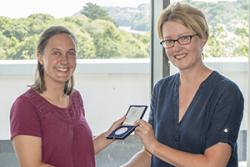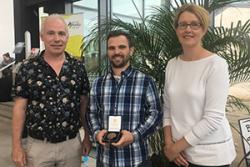Bangor University students awarded prestigious Drapers’ Company medals
Two Bangor University students have been presented with Drapers’ Medals. The Drapers’ Company is one of the historic Livery Companies of the City of London, and now a philanthropic organization. The Drapers’ Company kindly donates two medals each year to be awarded to outstanding postgraduate students. These prestigious awards takes into account the quality of a student’s research, teaching, and service to the University and community.
For over one hundred years the Company has been linked to the University, initially through substantial grants towards the construction of some of the University’s main buildings, including the library, science laboratories and the electrical engineering department.
The medals were presented by Professor Carol Tully, Pro-chancellor, who said: “We are extremely grateful to the Drapers for their continued support for the University and our students. We’re delighted that they keenly follow developments at the University and are inspired by our admirable students.”
 Megan Barker with Professor Carol TullyMegan Baker from Poole in Dorset who Studies at the School of Ocean Sciences received the silver medal. Megan’s PhD topic is the role of different types of cohesive ‘sticky’ clay in the mobility of underwater landslides, with applications in marine engineering and hydrocarbon exploration.
Megan Barker with Professor Carol TullyMegan Baker from Poole in Dorset who Studies at the School of Ocean Sciences received the silver medal. Megan’s PhD topic is the role of different types of cohesive ‘sticky’ clay in the mobility of underwater landslides, with applications in marine engineering and hydrocarbon exploration.
Megan was nominated by Dr Jaco Baas, Reader in Ocean Sciences, who said: “Megan is undoubtedly one of the most promising young researchers that the School has produced in the past decade. After graduating with extraordinarily high grades at BSc and MSc level, she has continued to shine as a PhD candidate. Now at the start of her third year, she has been building an international reputation as a physical sedimentologist.
“Megan recently published her first paper, and has three more papers planned for 2018. Her research is fundamental to various scientific disciplines, and her work is already highly rated by the clay mineral and hydrocarbon industries, deep-marine geologists, and hydraulic engineers.
“Her growing research profile is not only based on her hard work at Bangor, but also further afield as she has conducted research and training in Southampton, Cornwall, Suffolk, Aberystwyth, Netherlands, Norway, France, and Germany.
Extremely please to have received this award, Megan said: “I have had a lot of fun working towards my PhD at the School of Ocean Sciences, which is a fantastic department to work in. I am grateful for the opportunities my supervisor Dr Jaco Baas has made for me, and for his enthusiasm and dedication to the PhD project and my development as a researcher.
“During my PhD I have conducted laboratory experiments simulating underwater landslides and trying to understand how changing the proportions of different sediment types within the landslides effects how they behave. I really like the problem solving aspect of laboratory work as well as teaching and supervising undergraduate and masters students to conduct their own experiments. I also conduct geological fieldwork looking at the deposits of ancient underwater landslides and trying to understand the processes that formed the deposits. I very much enjoy this part of my PhD as it is a bit like being a detective, you have to work backwards from the evidence in front of you.
“I have also taken up opportunities to present my work at national and international conferences all of which have been great experiences, allowing me to travel to new and exciting countries which has opened my eyes to the range of research being conducted in my field. I now look forward to the final year of my PhD, receiving this award has given me a renewed drive.”
 L-R: Dr Hefin Gwilym, David Beck and Professor Carol TullyThe bronze medal was awarded to School of Social Sciences PhD Student, David Beck from Bangor, whose thesis topic is the changing face of food poverty.
L-R: Dr Hefin Gwilym, David Beck and Professor Carol TullyThe bronze medal was awarded to School of Social Sciences PhD Student, David Beck from Bangor, whose thesis topic is the changing face of food poverty.
David was nominated by Dr Hefin Gwilym, Lecturer in Social Policy, who said: “David has established excellent relationships with local community organisations. These partnerships have significantly helped the University with its poverty research in the north Wales area and he has been a leader in establishing the North Wales Poverty Alliance Network.
“He is the first to research modern day food poverty in Wales. A major part of the research was an examination of the recent phenomenon of food banks in Wales which he has mapped. His research has made a very important contribution to understanding poverty in Wales, and it has contributed to the process of developing policies to address the challenges of tackling poverty in Wales.”
“David has given expert evidence to various parliamentary committees including the Welsh Government on tackling poverty in Wales and the All-Party Parliamentary Inquiry into Hunger in the UK.
David said: “My research into the increasing number of food banks across Wales came as a direct result from my time volunteering at the Cathedral Food Bank in Bangor. Listening to the stories of those people who have been left behind by a retrenching provision of social security, I have been truly humbled by their description regarding the circumstances, which have caused their food poverty.
“I give regular presentations to church and community groups, and to social workers, people who interact with those experiencing food poverty, with the hope that this will better inform their practice.
“The findings of my research hopefully, will help in the creation of a poverty research hub here at Bangor University, where I would like to develop further research into the role of poverty, and its interaction within modern society. Further research would be conducted on topics such as; school food and free school meals provision, holiday hunger, food waste and sustainability, food geographies and food deserts, with the overarching component looking at the role of food and poverty in society.
“In recognition of receiving this medal, I would like to express my sincerest thanks to my partner Siobhan and our children, as they have endured this journey with me for the last ten years. I would also like to thank the School of Social Sciences and my main supervisor Dr Hefin Gwilym for his support and encouragement. I would also like to thank staff in SENRGy, especially Ian Harris for his GIS skills, and my second supervisor Dr Eifiona Thomas Lane, who has been through this journey with me since my undergraduate studies.”
Master Draper Steven Roderic Beharrell, said: “The Drapers are delighted to award the Drapers medals to two postgraduate students whose work is inspirational. We really value our relationship with Bangor University which has been going on for many years and I hope will continue for many years to come.”
Publication date: 18 July 2018
